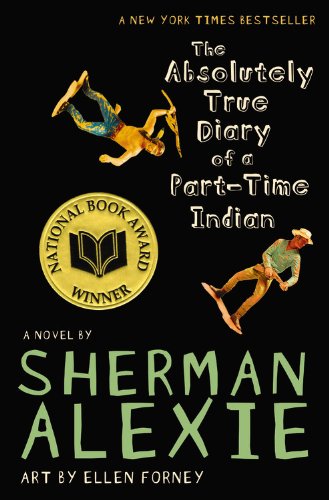All Nonfiction
- Bullying
- Books
- Academic
- Author Interviews
- Celebrity interviews
- College Articles
- College Essays
- Educator of the Year
- Heroes
- Interviews
- Memoir
- Personal Experience
- Sports
- Travel & Culture
All Opinions
- Bullying
- Current Events / Politics
- Discrimination
- Drugs / Alcohol / Smoking
- Entertainment / Celebrities
- Environment
- Love / Relationships
- Movies / Music / TV
- Pop Culture / Trends
- School / College
- Social Issues / Civics
- Spirituality / Religion
- Sports / Hobbies
All Hot Topics
- Bullying
- Community Service
- Environment
- Health
- Letters to the Editor
- Pride & Prejudice
- What Matters
- Back
Summer Guide
- Program Links
- Program Reviews
- Back
College Guide
- College Links
- College Reviews
- College Essays
- College Articles
- Back
The Absolute True Diary Part-Time Indian by Sherman Alexie
Floods and Lifeboats
When I began reading The Absolutely True Diary of a Part-Time Indian, the opinion I slowly formed had a lot to do with the fact that it was unlike most other novels. To me, this work was more entertaining than most, and it did not drag on. The way Sherman Alexis, the book’s author, describes the life experiences of his protagonist, Arnold Spirit, is incredible. Arnold, a Spokane Indian living on the Reservation with his family and friends, ultimately decides to attend an all-white high school just outside of “the rez,” or reservation. He goes in search of something, most likely a brighter future. Despite many social hurdles that Arnold faces, the novel overflows with hope, something Indians are not necessarily destined to have much of in the course of a lifetime. One quote from Arnold himself describes his life and his contribution to his people, and he uses the simple analogy of floods and ships. Arnold states, “I think the world is a series of broken dams and floods, and my cartoons are tiny little lifeboats.”
Two yardsticks I feel occur most in Alexie’s The Absolutely True Diary of a Part-Time Indian are ‘escape’ and ‘personal beliefs’. One example of ‘personal beliefs’ is the main conflict of the novel. Arnold, a character who acts as a mouthpiece for Alexie’s life experiences, chooses to leave the reservation. This is difficult because he has to leave everything he knows and fend for himself in a wealthy, predominantly white environment many miles away. His community somewhat singles him out for having betrayed them, and he finds himself somewhat tugged in two directions. He is caught between the all white high school and his unimaginably impoverished home base. He seems forced to make a new identity for himself, but always remains true to his deep sense of humor.
The second yardstick is ‘escape’. Using the literary devices of humor and hyperbole throughout the story, Arnold is able to see himself in a much different light after awhile. He is much more than what others perceive him to be. As he recognizes this, he shares it with the reader who perhaps has no idea what it is like to be a Native American or to a minority at all. Contrasting himself against a school population of only white teenagers, the differences are magnified. Arnold finds that he is a teenage boy, filled with words and images and ideas and thoughts and feelings all his own. As he explores his inner self, so does the reader. This helps to manage the more depressing events of the story, which are also hard to imagine. Arnold himself becomes a boat that carries the reader from the negative to the positive. His words therefore are true, and what he produces are “little lifeboats,” even for the reader.
Similar Articles
JOIN THE DISCUSSION
This article has 0 comments.

